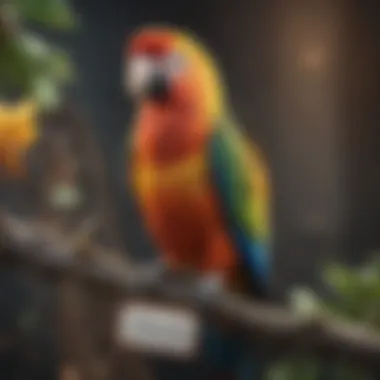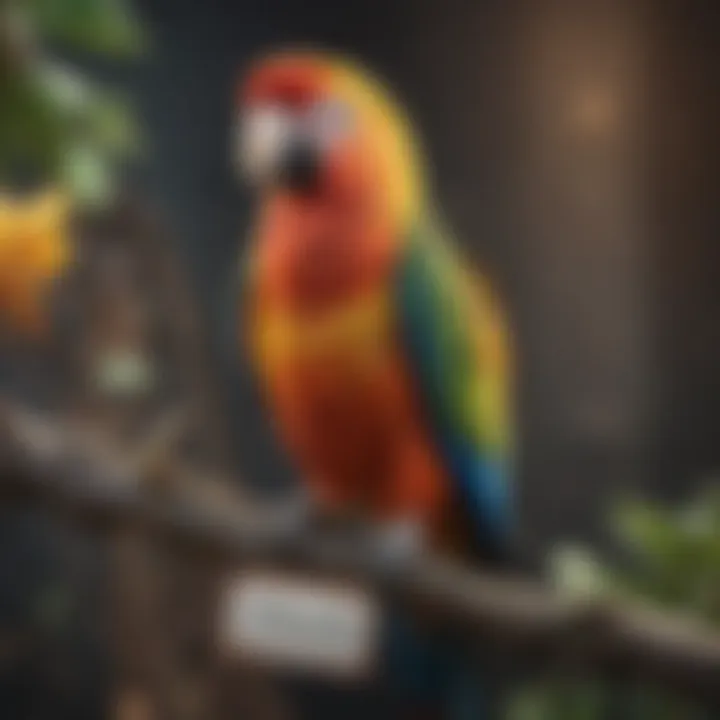A Guide to Creative and Unique Pet Bird Names


Intro
Choosing a name for a pet bird is more than a trivial pursuit; it encapsulates a significant moment in pet ownership. Each bird possesses its own distinct personality, behavioral quirks, and traits which can serve as excellent inspirations for their name. A name can be humorous, serious, or a tribute to something meaningful. This article delves into unique strategies for selecting names that not only match your bird’s lively character but also deepen your connection with it.
This guide aims to assist bird owners in navigating various aspects of naming their feathered friends. We will explore different categories of names influenced by culture, appearance, and personality. Additionally, practical considerations for effective naming will be discussed, all designed to help enhance the overall bond between you and your pet bird.
Understanding the Importance of Naming
Choosing a name for a pet bird is more than just a casual decision. It carries both emotional weight and practical implications. Names are not merely labels; they foster bonds between owners and their feathered companions. A well-chosen name can enhance daily interactions, making communication more effective and meaningful.
Birds are often sensitive to sounds, and their names can have a significant impact on their behavior. A unique name can establish a sense of identity for the bird, allowing it to recognize and respond to its owner. This connection deepens the relationship and lays the groundwork for training and companionship. Additionally, the right name can reflect the personality and traits of the bird, further solidifying that bond.
The act of naming a pet is a declaration of ownership and affection. It reflects personal identity and intention, allowing owners to express their feelings and choices through their pets. A name should capture the essence of the bird, whether it's a playful finch or a chatty parrot. This is why understanding the significance of naming is so crucial for any pet owner.
"The name you choose for your bird can mean more than you realize; it is a way to establish a connection and show your bird that you care."
The Role of a Name in Animal Bonding
Names serve as the foundation for interaction. They are the first words the bird will learn and relate to human presence. Birds are social creatures, and having a name assists in reinforcing the bond between the human and animal. In many cases, a bird will respond better to its name if it resonates with its personality or behaviors. Engaging with your bird using its name fosters trust and understanding.
As birds develop their social skills, their names play a role in shaping their experiences. A name can create a sense of belonging, paving the way for bonding moments between the pet and the owner. It's a step toward making the pet feel valued and loved.
Psychological Impact of Names on Perception
Interestingly, names can influence perceptions and interactions. Research has shown that people often form opinions based on a name's characteristics. A quirky name might draw positive responses, while a common name may not evoke the same enthusiasm. This can be relevant not only to social interactions but also to how other people perceive the bird.
Selecting a distinctive or humorous name can highlight the unique aspects of the pet's nature. Additionally, names may elicit certain emotions from the owner and their community.
Understanding the psychological impact of a name ensures that owners consider their choices carefully. The name can become a reflection of the owner's values or humor, enhancing the overall experience of pet ownership.
Ultimately, choosing the right name is pivotal. It holds the potential to influence the relationship and provide insight into the owner's personality and priorities.
Categories of Funny Pet Bird Names
Selecting a name that blends humor with distinct character can significantly enrich the experience of bird ownership. Funny names contribute to the joy of interacting with pet birds. They bring a light-heartedness that can elevate the bond between owner and bird. This section explores the categories of funny pet bird names, delving into diverse influences that can guide pet owners in their naming process.
Names Inspired by Famous Characters
Names inspired by famous characters from movies, television, and books provide an immediate connection between the bird and popular culture. These names resonate well due to their familiarity and emotional impact. For example, naming a parrot "Yoda" evokes intuitive associations with wisdom and playfulness, aligning well with a bird's personality. Similarly, a lively canary might suit the name "Daffy" after the well-loved cartoon character.
These references also make for great conversation starters and can enrich social interactions with family and friends. When choosing a name inspired by a character, it is beneficial to consider the traits associated with that character and how they reflect your bird's quirks. Not all characters will fit every bird, so specificity is key.
Names Based on Pop Culture References
Pop culture references, ranging from popular songs to internet memes, can be equally amusing and fitting. Names such as "Beyoncé" for a stylish and vocal bird or "Pikachu" for a bright and energetic pet can resonate with many. These references capture contemporary ideas, thus making the name relevant and relatable.
Additionally, pop culture names often carry a humorous or whimsical connotation, which can lighten the mood in your household. They serve both as a fun aspect of pet ownership and an inside joke among bird enthusiasts who recognize these references well. The popularity of characters or concepts can change, making it a dynamic way to engage with your pet and the world around.
Playful Puns and Wordplay
Playful puns and clever wordplay are other fascinating avenues for naming pet birds. Names like "Wingston" or "Feather Locklear" showcase creativity while providing a dose of humor. Puns can be derived from the bird's physical traits, behavior, or sounds they make. This approach not only reflects the personality of the bird but also adds a personal touch from the owner.
The playful nature of these names often encourages endearment and affection. Here, timing and understanding of the puns used matter, as some may connect deeply with an owner's sense of humor while feeling lost on others. Ultimately, wordplay adds a layer of rapport between owner and pet that can be profound while also playful.
Themed Names from Literature and History
Literature and history provide a treasure trove of inspiration for bird names. Themes drawn from classic literature, historical figures, or even significant events can yield amusing and intriguing name choices. A bird named "Gulliver" could reflect a sense of adventure, while “Ariel,” inspired by literary works, might suit a graceful feathered friend.
These names often stimulate conversation and encourage learning, as they invite others to understand the stories or histories they stem from. They also highlight the owner's interests and experiences, establishing a deeper context for the relationship with the pet. Choosing a name that encapsulates a piece of these narratives makes the experience richer and substantially unique.
Choosing a funny or unique name establishes an emotional connection that enhances the companionship between you and your bird. This can lead to a more engaging and fulfilling interaction.
In summary, categorizing funny pet bird names helps pet owners express their individuality and foster connections with their feathered companions. Each category discussed can harmonize humor, personality, and character, making the naming process enjoyable and meaningful.
Cultural Influences on Bird Naming
Naming pet birds is not merely a whimsical task; it encapsulates cultural nuances and personal connections. Each name carries weight. It reflects traditions, local humor, and even historical significance. Understanding cultural influences in bird naming helps pet owners make informed choices. It can enrich the experience of owning a bird. This section examines global naming trends, variations in humor, and how culture shapes our interactions with these feathered companions.
Global Naming Trends
Around the world, trends in naming birds often mirror societal influences. In many cultures, pet names reflect admiration for local wildlife or national symbols. For instance, in tropical regions, names may draw from vibrant flora and fauna, reflecting the natural environment. Birds might be named "Jade" after the precious stone found nearby. Meanwhile, in Western cultures, names like "Peanut" or "Coco" portray a playful attitude. Popular culture also plays a role. Movies or television series often inspire trends. Here are some notable global naming trends:


- Nature-Inspired Names: Birds often get names linked to their physical traits or habitat, like "Sky" for a blue parakeet.
- Celebrity Influence: Pet names like "Beyonce" or "Einstein" show admiration for public figures.
- Cultural References: Terms from mythology or folklore, such as "Zeus" or "Nala," highlight cultural heritage.
Understanding these trends helps in choosing a name that resonates personally while reflecting broader societal values.
Regional Variations in Humor
Just as naming trends vary globally, so too do regional interpretations of humor. Humor is subjective and tied closely to cultural context. Some regions favor playful puns, while others lean toward names that exhibit ironic or sarcastic undertones. For example, in the United States, people often choose light-hearted names like "Sir Chirps-a-lot" for their birds. This creativity might stem from the country’s general inclination toward playful banter.
Conversely, in places like Japan, the humor could be more subtle and connected to traditional poetry. Names might invoke literary references that resonate with cultural appreciation.
Consider these points regarding regional humor in naming:
- Playfulness vs. Subtlety: Different cultures show varying levels of humor in names, from overtly funny to subtly clever.
- Local Language: Idioms or expressions unique to an area often find their way into bird names, bringing local flavor.
- Shared Experiences: Names that unite community experiences, like "Nugget" for beloved local snacks, show strong connections within regions.
Humor, in the context of pet naming, can serve as a social bridge, connecting owners within communities through shared laughter.
Engaging with cultural influences in bird naming adds depth to the act. It highlights not just the affection for one’s pet but also a connection to larger societal narratives and traditions. Ultimately, these insights guide pet owners in selecting a name that acknowledges personality, uniqueness, and cultural roots.
Traits to Consider in Naming Your Bird
Naming a pet bird is not merely an act of assigning a label. It intertwines with the very essence of the relationship between the owner and the pet. In this section, we will explore the nuanced traits one must consider when choosing a name that is both fitting and reflective of the individual bird's character.
Evaluating Bird Personality
Understanding a bird's personality is central to selecting an appropriate name. Each bird possesses unique behaviors and temperaments. Some may be playful and energetic, while others could be more reserved or inquisitive. For instance, a lively parrot that enjoys mimicking sounds might suit a name that captures its exuberance, such as "Zippy" or "Echo".
Alternatively, a calm canary might lend itself well to a gentler name like "Serena" or "Harmony". The connection between the bird's personality and its name can enhance the bond. Choosing a name that resonates with how the bird behaves allows owners to better engage with their pets.
Here are some factors to consider:
- Activity Level: Choose a name that reflects the energy of the bird.
- Social Interaction: Some birds love company, while others prefer solitude. Name accordingly.
- Vocalization Style: Consider a name that rings true to their vocal habits.
Physical Characteristics and Naming
Physical traits are another crucial aspect when deciding on a name for a bird. The bird's colors, size, and distinct features can inspire imaginative naming. A striking blue budgie might be called "Cobalt", while a vibrant red canary could be aptly named "Ruby".
Additionally, unusual features can also spark creativity. For example, a bird with a unique feather pattern may need a name that celebrates its individuality, like "Dottie" for a bird with dotted plumage.
When selecting a name based on physical characteristics, consider the following:
- Color: Reflect the bird's color in the name.
- Size: A small bird could have an endearing name like "Tiny", while larger species might evoke more powerful names like "Titan".
- Distinguishing Marks: Uncommon traits can lead to distinctive names that truly stand out.
Choosing a name that aligns with both personality and physical characteristics creates a connection between you and your bird. It transforms the naming process into an intuitive experience, deepening the bond and enhancing communication.
Practical Considerations for Bird Names
Choosing a name for your pet bird goes beyond mere aesthetics; it is an essential part of creating a bond with your feathered friend. Practical considerations play a crucial role in ensuring that the name you choose is not only unique but also functional in your daily interactions. Understanding these factors can help streamline the process, making it easier for both you and your bird to embrace the chosen name.
Assessing Ease of Pronunciation
One of the foremost practical concerns in naming your bird is how easy it is to pronounce. The simplicity of the name can significantly impact how well your bird learns to recognize it. This is particularly important since birds respond to sound and can learn and associate specific sounds with experiences or commands.
Renowned bird trainers suggest using names that have one or two syllables. A name like "Sunny" or "Sky" is easy to articulate. Avoid complicated or lengthy names with multiple syllables. These may lead to confusion for your bird. In addition, shorter names reduce the risk of miscommunication when calling your pet.
"Birds respond better to clear, concise sounds. The easier the name, the more chances it has for meaningful interaction."
Consider also how a name sounds when you say it out loud. A name that feels awkward or difficult to pronounce might not resonate with you. Ultimately, if speaking the name becomes a challenge for you, it could lead to less frequent use and affect the bond you share with your bird.
Compatibility with Training Commands
Another vital element concerns the compatibility of your chosen name with training commands. Birds often learn to respond to verbal cues, which includes their name. Ideally, the name you select should not sound too similar to common commands, such as "come," "stay," or "no." If the name is too ambiguous, it can impede the training process and create confusion.
For example, if you name your parrot "Bee," it might become startled when you ask it to "be still." Such overlapping sounds can complicate interactions and limit the bird's responsiveness.
Consider using distinct sounds or phonetic structures that help separate the name from other common commands. Furthermore, adopting a name that shares rhythmic qualities can enhance memorability and quick recognition. Strive for a balance between a name that is easy to say and one that assists in your training efforts.
When you analyze these practical factors, your choice of bird name not only becomes a matter of preference but also a thoughtful decision that contributes to successful communication and a fulfilling relationship with your pet.
Suggestions for Specific Bird Types
Choosing a name for your pet bird can be a meaningful process, especially when considering the specific characteristics of different bird types. Each species has its own unique traits that can influence name selection. For instance, parrots are known for their intelligence and vocal abilities, while canaries are appreciated for their beautiful singing. Budgies, on the other hand, are small and lively, often reflected in their playful nature. This section will guide you through naming conventions based on common pet bird types, ensuring that the selected name resonates with the individual personality of the bird.
Names for Parrots


Parrots are among the most popular pet birds, and their names can reflect their vibrant personalities and dynamic behaviors. The intelligence of parrots allows for engaging interactions, making names that reflect their quirky and curious nature suitable. Here are some advisable name options:
- Coco: A classic choice, this name works well with various parrot species.
- Kiwi: This name suits parrots with bright colors and an outgoing personality.
- Rio: A name that mirrors the lively spirit and exotic origins of many parrots.
When choosing a name for a parrot, consider the bird's vocal capabilities. Names that are short and easy to pronounce often fare well. Important elements to contemplate include the bird’s specific traits, like color patterns, or even their favorite activities. The connection you establish will elevate the bond between you and your parrot.
Names for Canaries
Canaries are valued for their melodious songs and charming demeanor. When selecting a name, you might want to tap into their musical attributes. Ideal names often reflect their songbird heritage.
- Melody: A straightforward and fitting name for a bird that sings beautifully.
- Sunny: Perfect for a cheerful canary that brings a touch of brightness to your home.
- Breeze: A name that invokes the light and airy sound of a canary's song.
Consider the canary's singing ability and color, like vibrant yellows or soft pastels, when opting for a name. A name that resonates with their traits will enhance the bond.
Names for Budgies
Budgies, or parakeets, are known for their playful and social nature. Their names should reflect their energetic and friendly disposition.
- Skittles: A fun name that implies colorfulness and playfulness.
- Pepper: Suitable for a speckled budgie, indicating a spunky personality.
- Nibbles: This name captures the playful habit many budgies display during play and exploration.
When wrangling a name for a budgie, think about its behavior and distinctive colors. They are often interactive with their owners, making it important to choose something that feels right during engagement. Mindful consideration of these factors will result in a special connection and a name that complements your budgie's personality.
The Naming Process: A Step-by-Step Guide
Choosing a name for your pet bird is not just a casual process; it is a significant step in your journey as a bird owner. This section provides a structured approach to naming, outlining an effective method to develop a meaningful connection with your feathered friend. By understanding the different stages involved, you can ensure that the chosen name not only resonates with you but also fits the bird's unique personality. This guide covers engaging with your bird, performing trial runs of potential names, and finalizing the name in a thoughtful manner.
Engaging with Your Bird During the Process
Engaging with your bird is the initial phase in the naming process. It establishes a level of trust and familiarity that is crucial for your relationship. Spend time observing your bird’s behavior. Each bird has its own personality, which can be reflected in the name you ultimately select. For example, if your bird is playful, consider names that evoke a sense of fun.
During this engagement:
- Talk to your bird regularly: Use a gentle tone to promote a sense of safety.
- Interact through play: Engage in activities that showcase your bird's traits.
- Observe reaction to sounds: Birds often respond to different phonetics; noting these can inform your naming choices.
Trial Runs with Potential Names
Once you have a list of names that could suit your bird, it’s time to conduct trial runs. This is where you see how your bird responds to each name. Start slowly. Call out the names you have in mind and observe which ones draw attention. Birds often have preferences for types of sounds or even syllables in names.
Here are some tips for conducting effective trial runs:
- Be consistent: Use the same names during this phase. Inconsistent naming can create confusion.
- Observe body language: Pay attention to signs of recognition or disinterest.
- Use treats: Associate name calls with positive experiences, such as offering a favorite treat when responding to a name.
Finalizing the Name: Tips
After conducting your trial runs, it's time to finalize the name. This step involves reflection and considerations on both fleeting impulses and deeper emotional connections. You may have a name that feels just right, but it’s essential to ensure it satisfies practical aspects as well. Here are some key tips:
- Evaluate the emotional resonance: Does the name feel affectionate? Does it connect with you personally?
- Consider ease of pronunciation: Choose a name that is easy to say. This is especially important when calling your bird or using commands.
- Check compatibility with training: Some names may sound too similar to commands or cues. Ensure the name chosen isn’t easily mistaken for other commands.
"A name is more than just a word; it encapsulates the bond between you and your pet. Ensure it speaks to that connection."
In summary, the naming process is a thoughtful journey. Engaging with your bird sets the tone, trial runs provide valuable feedback, and finally, selecting a name that resonates with both of you consolidates your bond. Through these steps, you can craft a name that is not only unique but also deeply significant.
Common Pitfalls in Naming Birds
Choosing the right name for your pet bird is a significant step in pet ownership. While it may seem simple at first, pitfalls can occur that affect both the bond between you and your pet and the practicality of daily interactions. Recognizing these common pitfalls is essential. It helps ensure that the name you select will not only resonate with your bird's personality but also create a nurturing environment.
Avoiding Overly Complicated Names
One of the most frequent mistakes is selecting an overly complicated name. A name that is too long or difficult to pronounce can create barriers to communication. Birds thrive on consistency and clarity. If they cannot easily recognize or respond to their name, it can hinder training and interaction.
For instance, names like "Sir Waddlesworth the Third" might be amusing, but they are not functional for everyday use. Instead, shorter names, such as "Waddles" or even just "Sir," are more effective. This should make it easier for both you and your bird.
Keep in mind:
- Simplicity: Choose names that are easy to say. One or two syllables are best.
- Distinct Sounds: Opt for names that include distinct sounds, making it easier for your bird to recognize.
"The strength of a name lies not in its length or complexity, but in its clarity and connection with the pet."
Steering Clear of Names with Negative Associations
Another crucial consideration is to avoid names that carry negative connotations. Using a name associated with unpleasant experiences can lead to an unintentional emotional impact. For example, naming a bird after a historical figure involved in a scandal or a character known for villainous traits may not foster a positive environment.
Birds are perceptive animals. They can pick up on the emotional tone of your voice and the context surrounding their name. If the name has negative vibes, it might create an unfriendly atmosphere between the owner and the pet.


In making your choices, consider:
- Emotional Impact: Choose names that create positive associations for both you and your bird.
- Personal Reflection: Reflect on how the name resonates with your feelings and the energy you want to create within your home.
When selecting a name, remember that names carry weight. A thoughtful approach is essential to avoid pitfalls that could affect your bond with your feathered friend.
Changing Names: When and How
Changing a pet’s name is often a delicate decision for owners. A name carries personal meaning, both for the bird and the human companion. However, circumstances can arise where the original name no longer aligns with the bird’s character or the owner’s perception. Understanding when to change a name and how to do so respectfully can strengthen the bond between owner and pet.
Understanding When a Name No Longer Fits
A name may become unsuitable for various reasons. One primary factor is the evolution of a bird’s personality. As birds grow and adapt to their environment, their behaviors can change. For example, a shy budgie might develop more confidence over time and become quite playful. A name that once felt appropriate might start to feel misaligned with these new traits.
Another consideration is the emotional connection that the owner develops with the bird. If a name evokes negative feelings or memories, it can create an emotional dissonance. Owners might find themselves less inclined to call their pet, which could impact communication and bonding.
There are also practical reasons for name changes. For instance, names that sound similar to common commands might confuse a bird during training. Ensuring that the name is distinct from commands can foster a more effective training environment.
Strategies for a Smooth Transition
Transitioning to a new name requires thought and patience. Here are methods that can help make the process seamless:
- Introduce the New Name Gradually: Start by using the new name alongside the old one. For instance, you might say, "Hello, [Old Name], or [New Name]!" This helps your bird associate the new name while still holding onto familiarity.
- Use Positive Reinforcement: Every time you use the new name, offer treats or affection. This builds positive associations with the new name and encourages your bird to respond.
- Maintain Consistency: Use the new name consistently during all interactions. Repetition reinforces recognition. Eventually, the bird will begin to learn the sound of its new name.
- Be Patient: It may take time for your bird to adjust. Patience is essential during this learning curve. Acknowledge any steps your bird takes toward recognizing its new name.
- Celebrate the Change: Once your bird becomes accustomed to its new name, celebrate the moment with some special treats or a fun play session. This helps establish a positive relationship with the new identity.
Changing a bird’s name is not without its challenges, but with careful consideration and nurturing, it can lead to a renewed sense of identity for both the bird and its owner.
Namings can reflect vast changes in personality and environment, and understanding the right timing for a name change is crucial for keeping that bond strong.
Engaging the Community in Naming
The journey of naming a pet bird can be enriched significantly by engaging with others in the bird ownership community. This includes sharing experiences, ideas, and stories revolving around names. Involving the community serves not only as a source of inspiration but also facilitates a deeper connection with fellow bird lovers through the shared journey of pet ownership.
One specific benefit of community engagement is the opportunity for learning. Other bird owners often share unique naming conventions or insights that might resonate with the personality of your bird. These discussions can reveal trends and foster creativity in naming your own feathered friend. Moreover, finding out what works or does not work for others can guide you to make a well-informed choice for your pet.
It is also important to consider the emotional aspect. Naming a pet is an intimate experience. Engaging with others allows owners to share the sentiments attached to their bird's name. This exchange often produces not only laughter and joy but sometimes even touching stories that deepen the bond between owners and their pets. Through these narratives, one can reflect on their own experiences and the journey of bonding with their bird.
Sharing Naming Stories with Other Owners
Bird owners often have fascinating stories regarding the names they chose for their pets. Sharing these anecdotes fosters connections among owners, creating a supportive environment. For example, a name might have been inspired by a quirky behavior of the bird, or perhaps it represents a cherished memory.
Online forums and social media groups often become platforms where these stories are exchanged. Whether it be on Facebook groups dedicated to pet birds or threads on Reddit, these spaces offer an engaging context for storytelling. By integrating personal experiences into naming discussions, owners can inspire one another, leading to more creative naming ideas.
A potential format for sharing could be through themed challenges. For instance, a group could decide to share names along a specific topic, like names inspired by colors or names that evoke a sense of adventure. These challenges can stimulate greater participation while offering owners a chance to showcase their unique choices.
"A name can often tell a story and spark connections that enhance the experience of pet ownership."
Participating in Online Naming Polls
Another effective way to engage the community in naming discussions is through online naming polls. These polls can be organized on various platforms where bird lovers gather, such as Facebook or Reddit. They provide a fun and interactive way for owners to solicit opinions on potential names for their birds.
Setting up a poll is straightforward. Owners can present a few name options, possibly derived from community discussions or personal favorites, and ask members to vote. This not only provides a sense of involvement but also showcases the preferences of various community members. Poll results can highlight trends in naming or even surprise choices that others find appealing.
Additionally, polls can create a sense of anticipation and excitement. When a community engages through these light-hearted activities, it can strengthen bonds and result in shared memories. The interaction can lead to discussions about why certain names were chosen, often stemming from personal experiences or cultural influences.
In summary, involving the community in the naming process not only fosters a sense of belonging but also provides valuable insights, encourages creativity, and connects people through shared stories and experiences. This engagement enriches the naming journey, allowing bird owners to choose a name that resonates deeply with their bird's personality.
Concluding Thoughts on Naming Your Bird
Choosing the right name for a pet bird can seem simple, but it hosts layers of meaning and significance. Throughout this article, it has become clear that naming is more than a routine act; it is a foundation of the bond between the owner and the bird. The name reflects individual personalities, emotional ties, and even cultural backgrounds. After all, the act of naming helps to establish a connection. It allows owners to think about the bird’s unique traits and create a personal identity for the pet within their home.
A thoughtful name can lead to better communication and understanding. Birds often respond to names given to them, making it easier for their owners to engage and train them. These names can carry stories and emotions, bridging the gap between human and avian behaviors. The process of selecting a name should not be rushed. Careful consideration allows for reflection on what the bird represents and the relationship the owner hopes to cultivate.
"The name you choose can enhance your relationship with your bird, encouraging a more profound interaction."
The Emotional Connection Between Name and Bird
The name given to a pet bird often embodies deeper emotional significance. Birds may become symbols of companionship, relaxation, or joy. When you name your bird, you are engaging in a ritual that signifies ownership, identity, and affection. Many owners speak fondly of their birds, often sharing anecdotes linked to the name they chose. This deep connection fosters a sense of responsibility and care.
An emotional name can transform a pet bird into a true member of the family. For instance, a name derived from a treasured memory or a personal value instills greater meaning. This approach provides a sense of belonging. When a bird has a name with a story, it reinforces the bond between the owner and the pet. The bird becomes a living embodiment of that story, which enhances the emotional landscape of life with the bird.
Reflecting Personal Identity Through a Bird's Name
The naming of a pet bird serves as a reflection of personal identity. Pet owners have a unique opportunity to convey their interests, values, and tastes through the names they choose. A name can reveal much about who the owner is—what they find amusing, what they admire, or their cultural influences.
For instance, an owner who loves literature may choose a name inspired by a favorite character or author. Alternatively, one who enjoys science might select a name that reflects the bird's species or behavior. Furthermore, these names often influence how the bird is perceived by others, showcasing the owner's personality through their choice.
When a bird's name aligns with the owner's identity, it enriches the bond further. It establishes a shared narrative. Thus, naming becomes a continuation of self-expression, enhancing the personal connection to the bird.
Using clever or meaningful names allows owners to create an environment that promotes understanding and companionship. These names do not simply label an animal; they frame the dynamic and unique relationship that exists.







